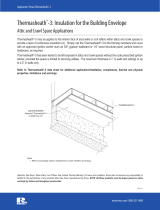Page is loading ...

Series 616KD One-Touch
®
Differential Pressure Transmitter
Specications - Installation and Operating Instructions
Bulletin P-616KDX
The Series 616KD One-Touch
®
Differential Pressure Transmitter senses the
pressure of air and compatible gases and sends a standard 4 to 20 mA or optional
voltage output signal. A wide range of models are available factory calibrated to
specic ranges. A single push button properly adjusts both zero and span. New
enclosure enables the 616KD-A/B to be mounted on a 35 mm DIN rail either via its
side or back DIN rail clips.
INSTALLATION
1. Location
Select a clean, dry mounting location free from excess vibration where the
temperature will remain between 20 and 122°F (-6.7 and 50°C). The tubing supplying
pressure to the instrument can be practically any length required, but long lengths
will increase response time slightly.
2. Position
A vertical position, with pressure connections pointing down, is recommended.
That is the position in which all standard models are calibrated at the factory. Consult
factory for other position orientations.
3. Pressure Connections
Two integral barbed tubing connections are provided. They are dual-sized to t both
1/8 and 3/16˝ (3.12 and 4.76 mm) I.D. tubing. Be sure the pressure rating of the
tubing exceeds that of the operating ranges.
4. Electrical Connections:
Electrical connections are made to the terminal block located on the top of the
transmitter. Terminals are marked 1, 2, 3 and 4 as shown below. Determine which
of the following circuit drawings applies to your application and wire accordingly.
Shielded cable is recommended. Ground the shield at the power supply end only.
SPECIFICATIONS
Service: Air and non-combustible, compatible gases.
Wetted Materials: Consult factory.
Accuracy: 616KD-A: ±0.25% FS; 616KD-B: ±1% FS; 616KD-C: ±2% FS.
Stability: ±1% FS/year.
Temperature Limits: 0 to 140°F (-17.8 to 60°C).
Compensated Temperature Range: 20 to 122°F (-6.67 to 50°C).
Pressure Limits: 2 psig (ranges 5 in w.c. or lower); 5 psig (ranges 10 to 40 in w.c.).
Thermal Effect: 616KD-A: ±0.02% FS/°F; 616KD-B: ±0.04% FS/°F; 616KD-C:
±0.06 FS/°F, includes zero and span.
Power Requirements: 4 to 20 mA output: 10 to 35 VDC (2 wire) or 12 to 26 VAC (4
wire); 5V output: 10 to 35 VDC (3 wire) or 12 to 26 VAC (4 wire); 10V output: 13 to
35 VDC (3 wire) or 12 to 26 VAC (4 wire).
Output Signal: 4 to 20 mA or option with eld selectable 0 to 10, 0 to 5, 2 to 10, 1
to 5 volts.
Zero and Span Adjustments: Push button.
Loop Resistance: 4 to 20 mA output (DC): 0 to 1250 Ω max. Rmax = 50(VpsDC
-10) Ω; 4 to 20 mA output (AC): 0 to 1200 Ω max. Rmax = 50(1.4 VpsAC -12) Ω;
Voltage output: 5K Ω minimum.
Current Consumption: 24 mA max.
Electrical Connections: Screw-type terminal block.
Process Connections: Barbed, dual size to t 1/8˝ & 3/16˝ (3 mm & 5 mm) ID
rubber or vinyl tubing.
Enclosure Rating: NEMA1 (IP20).
Mounting Orientation: Vertical with pressure connections pointing down.
Weight: 1.8 oz (51 g).
Agency Approvals: CE.
Do not exceed specied supply voltage ratings. Permanent
damage not covered by warranty will result. This unit is not
designed for 120 or 240 volts AC line operation.
CAUTION
7/8
[22.23]
1/2
[12.70]
2-13/32
[61.12]
3-21/64
[84.53]
5/16
[7.94]
Ø5/32 [3.97]
MOUNTING HOLE
2 PLACES
1/2
[12.70]
1-1/2
[38.10]
2-1/4 [57.15]
5/8
[15.88]
OPTIONAL
TERMINAL
COVER
1-1/32
[26.19]
2-13/32 [61.12]
Optional protective cap
Digital push button
sets both zero & span
®
DWYER INSTRUMENTS, INC.
P.O. BOX 373 • MICHIGAN CITY, INDIANA 46360, U.S.A.
Phone: 219/879-8000
Fax: 219/872-9057
www.dwyer-inst.com
e-mail: [email protected]

Printed in U.S.A. 8/19 FR# 443641-60 Rev. 5©Copyright 2019 Dwyer Instruments, Inc.
DWYER INSTRUMENTS, INC.
P.O. BOX 373 • MICHIGAN CITY, INDIANA 46360, U.S.A.
Phone: 219/879-8000
Fax: 219/872-9057
www.dwyer-inst.com
e-mail: [email protected]
4.1: 4 to 20 mA OUTPUT CONNECTIONS 4.2: VOLTAGE OUTPUT CONNECTIONS
ZERO ADJUSTMENT
A single push button is provided to zero the transmitter. For A and B models a side
mounted zero push button is provided in addition to the standard push button. The
zero calibration can be set by applying zero pressure to both the pressure ports and
pressing the zero button for 2 seconds. Span is factory calibrated to the range speci-
ed on the label. There is no user span adjustment necessary.
CHANGING OUTPUT SIGNAL
To change output signal see dipswitch settings in Figure 3 – OUTPUT SIGNAL DIP-
SWITCH SETTINGS.
MAINTENANCE/REPAIR
Upon nal installation of the Series 616KD no routine maintenance is required. The
Series 616KD is not eld serviceable and should be returned if repair is needed. Field
repair should not be attempted and may void warranty.
WARRANTY/RETURN
Refer to “Terms and Conditions of Sales” in our catalog and on our website.
Contact customer service to receive a Return Goods Authorization number before
shipping the product back for repair. Be sure to include a brief description of the prob-
lem plus any additional application notes.
Figure 1
Figure 2 Figure 4
Figure 3
Mounting holes
Mounting holes
Auto Zero
Auto Zero
Output Signal
Dipswitch
Settings
Lift the tab to
select voltage
output range
(default setting:
2-10V)
1 2 3 4 1 2 3 4
2-10 VDC
0-10 VD
C
1-5 VDC
0-5 VDC
PRESSURE
TRANSMITTER
POWER SUPPLY
10 - 35 VDC
PRESSURE
TRANSMITTER
POWER SUPPLY
10 - 35 VDC
OR
12 - 26 VAC
RECEIVER
RECEIVER
1
2
3
4
1
2
3
4
2-WIRE CONNECTIONS (4 to 20 mA)
4-WIRE CONNECTIONS (4 to 20 mA)
PRESSURE
TRANSMITTER
PRESSURE
TRANSMITTER
RECEIVER
RECEIVER
3-WIRE CONNECTIONS (VOLTAGE OUTPUT)
4-WIRE CONNECTIONS (VOLTAGE OUTPUT)
1
2
3
4
1
2
3
4
POWER
SUPPLY
POWER
SUPPLY
V OUT
V OUT
(SEE SPECIFICATIONS
TABLE FOR POWER
REQUIREMENTS)
(SEE SPECIFICATIONS
TABLE FOR POWER
REQUIREMENTS)
This symbol indicates waste electrical products should not be disposed
of with household waste. Please recycle where facilities exist. Check with
your Local Authority or retailer for recycling advice.
/

